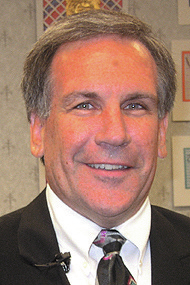
As I have written in previous articles, one of the perks (or curses, as the case may be) of being a school superintendent is that I receive legislative updates that provide me with a recap of the latest discussions on education occurring in Columbus. While it is nice to be apprised of what our “leaders” are up to, it also comes with its risks, as I am quite certain my blood pressure soars the minute I begin reading about the latest nonsensical conversations that continue to occur at the state level.
A recent update focused on a report given by Gregory Cizek, who is a professor of educational measurement and evaluation at the University of North Carolina-Chapel Hill. Professor Cizek is described by our state superintendent as a testing expert who advises Ohio on its testing process. In his report to the state board, Professor Cizek discussed “the mechanics and validity of using artificial intelligence to grade student essays on state English tests.” For the uninitiated, that’s a fancy way of saying that computers do much of the grading of these tests, and he was assuring the state board that the process is legitimate.
While I have no doubt that Professor Cizek’s defense of the test scoring process was well-conceived, I have to admit that my eyes glazed over two sentences into reading his explanation, and my mind wandered to visions of rainbows, unicorns, and fairy tales.
One explanation for my malaise could be that I am too feeble-minded to comprehend any concept more complex than a normal sixth-grader can understand, but I prefer to think it was because I can’t possibly think of a reason why his explanation would matter. If the state continues to misuse test data to draw incorrect conclusions and create false solutions to the problems children who are not successful face, as it has done for 25 years now, does it really matter how the tests are graded? The fact is, it does not, and this discussion is symbolic of state policymakers’ incredible ability to ignore the pertinent while focusing on the inane.
To put this discussion into perspective, pretend for a moment that in the 1990s a medical lab devised a test that could diagnose a rare disease with 100 percent accuracy, and medical practices all over the state aligned with that lab. Pretend also that every physician in Ohio misinterpreted the test results from this lab’s tests and created their treatment protocols based on their misinterpretation. When the mortality rate for this disease remained unchanged, physicians, with furrowed brows and confused expressions would meet with the CEO of the lab company to be convinced that the testing process and results they were receiving were valid.
When doctors were assured that the lab results had been perfected, the lack of patient improvement became even more perplexing to them.
In our pretend world, one might think that at some point at least one doctor would have wondered aloud if perhaps the problem was the misuse of the results, not a faulty test, and that this misuse was creating false “cures,” which would explain why the patient outcomes never changed. But, apparently that scenario never crossed anyone’s mind.
Furthermore, pretend that the doctors and the CEO engaged in these same discussions for more than two decades, and even though they are assured over and over again that the test is perfect, nothing changes. But, nothing changes not because the test or how it is administered is faulty, but because the doctors are misinterpreting the results to create their “solutions.” That is why they are no solutions at all, and that is why they haven’t worked.
Now, take off your “pretend” hat, because that is exactly what education policy-makers have done since the early 1990’s. They have wasted time sitting in meetings like the one reviewed in the update I received, being assured that the grading of the tests they are mandating are valid, never once considering that maybe they are misusing the results to create faulty solutions for children who are failing. But, that is exactly what they have done, which explains why they are engaging in the same discussions today that were occurring in the 1990s. How can people who appear to be intelligent have continued this charade of engaging in the same discussions for 25 years, especially when their “solutions” have solved nothing? It is truly mind-boggling.
While I am certain Professor Cizek is incredibly knowledgeable about testing protocols, the fact is he wasted his time addressing the state board, and the board wasted its time listening to this drivel … again. Why can’t they see that as long as the test data continues to be used to “prove” points it does not prove, it doesn’t matter if a human, a computer, or a monkey scores the tests? Wouldn’t more than two decades of failed policies get someone’s attention? Apparently not.
Until/unless policymakers finally acknowledge all of the factors that contribute to how we all become successful or unsuccessful and until/unless policy-makers are willing to discuss strategies that attack the real reasons for students’ lack of success, these same conversations will still be occurring 25 years from now, just as they have for the last 25 years, and future generations of children will be failed by the very adults who should be protecting them.
They should all be ashamed of themselves.


